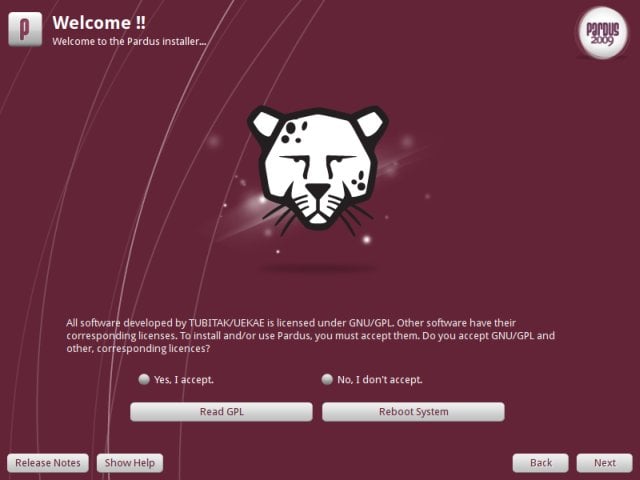The old Pardus, YALI was, and still is, the most awesome installer i've ever meet. Also Kaptan was amazing



From Wikipedia, the free encyclopedia
Linux is a family of open source Unix-like operating systems based on the Linux kernel, an operating system kernel first released on September 17, 1991 by Linus Torvalds. Linux is typically packaged in a Linux distribution (or distro for short).
Distributions include the Linux kernel and supporting system software and libraries, many of which are provided by the GNU Project. Many Linux distributions use the word "Linux" in their name, but the Free Software Foundation uses the name GNU/Linux to emphasize the importance of GNU software, causing some controversy.
Community icon by Alpár-Etele Méder, licensed under CC BY 3.0
The old Pardus, YALI was, and still is, the most awesome installer i've ever meet. Also Kaptan was amazing



Tuxedo OS, as preinstalled on my Tuxedo machine. It is just a heavily tweaked Ubuntu flavor with Plasma as a default desktop and sane defaults (firefox not as a snap, but as a .deb file). Everything worked so well out of the box that I did not see the point in installing Arch. I also love the fact that Plasma is kept very much up to date. In comparison, Kubuntu 24.04 still has Plasma 5., whereas I currently run 6.1.4.
Second impression of Garuda (Arch based). My first impression was the dragonized version, which is KDE with lots of mods to make it Mac like, but with extra window animations.
I like things simple, so when I tried Garuda again, I installed the Gnome version. Other than some weirdness getting my Nvidia card working with Wayland, it has run better than anything else on my laptop.
Fedora Atomic/Kinoite, just so relieved when one day I fucked the bootloader, and it didn't boot anymore, and I only needed to rollback in grub to a perfectly working system
You were able to get to the bootloader with a fucked up bootloader?
Maybe i "fucked the bootloader config" should be better, and with fedora unified kernel support, you can rollback using the UEFI entry so even a fucked bootloader wouldn't stop you
Fedora. I was always with Mint and Cinnamon. I tried Pop!Os, Manjaro and Debian, whenever I could with Cinnamon. Fedora was recommended to me, which I had never entered in the distros to try. I installed it and I've been using it for 2 years with its respective updates. No problems at all. I had not tried Gnome. I don't like it the most but I'm fine with it.
Arch Linux. All the software at their latest version (which is usually the best one), within a couple of commands, either from the huge official repos or the AUR.
Pop OS has worked out well for me even better than Ubuntu & Fedora.
Arch Wiki
Chimera Linux. You'd think that a distro using its own bsd-like userspace and dinit instead of systemd is janky and unusable, but it's been one of the most painless experiences I've had.
Genuinely recommend trying it if you don't have an Nvidia GPU.
Nixos
Fossapup 9.5 how fast yet compitent it is at what it can use. Loading into ram with just 300mb or so HDD space being used, it's blazing fast the newer the machine it runs on. It's downside is it's smaller community driven development being in need of consistant conversion of regular apps to it's own puppy .sfs format which is needed to install them, if they had people churning new .sfs apps out all day every day of the year then eventually it would over-shadow many mainstream OS's it's just nitro level speeds and very stable to boot. It needs more love from the dev community to go that extra mile.
Kurumin Linux, which was a Brazilian distro based on Knoppix. This was back in 2006 or so, and that was my first hands-on experience with Linux.
I don't fully remember whether everything worked out of the box, I think it connected to the internet no problem (cable), but what amazed me was:
1 - It ran off the CD drive without needing to install anything 2 - It had loads of preinstalled utility software 3 - Less than 700MB
Recently, uBlue. It’s more a family of fedora atomic images but it has taken the pain out of immutability for me. I was using Fedora silver blue and later Sericea a while back, but installing codecs from RPMfusion on it never worked properly and my hw acceleration was always broken. I was on NixOS for a while but had sporadic problems that come with NixOS not using an FHS structure. But uBlue just works. Hardware acceleration works out of the box, and I can easily create custom images with BlueBuild. It’s a very nice ecosystem to create a stable, secure, complete base system. And I run nix on top of it for user packages and home-manager to get all the benefits of both worlds
Sabayon. It worked perfectly till I tried to update some stuff 💣
This was one the most stable and at the same time the most unstable distribution I ever tried.